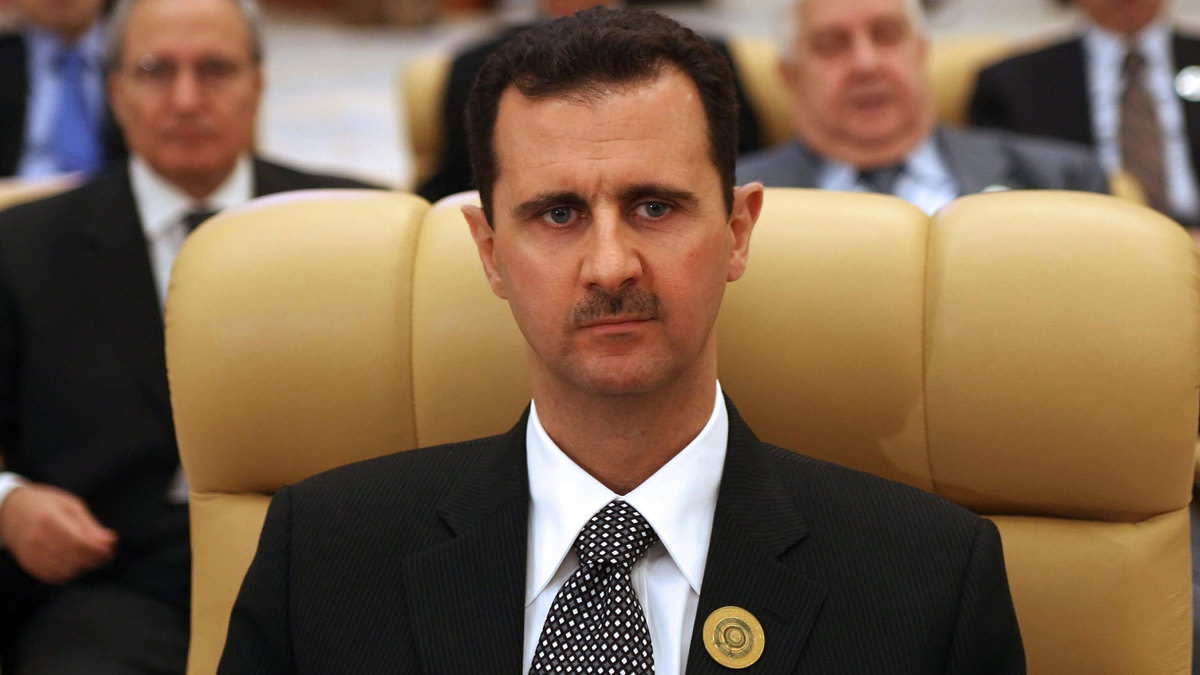GAZIANTEP, Turkey—After eight years of Syrian civil war, the deaths of hundreds of thousands of people, and the displacement of half the Syrian population, U.S. President Donald J. Trump’s decisions have created conditions for Bashar al-Assad’s regime to re-assert control over nearly one-third of the country that had been outside its grip since 2012.
Far from reining in U.S. adversaries, Trump’s presidency will likely be remembered as one through which Assad, this century’s greatest mass murderer, managed finally to claw his way back to a position of undisputed authority.
This is the way that’s playing out on the ground in what is, admittedly, still a complicated situation.
The news began Tuesday morning with Russian pro-Kremlin journalist Oleg Blokhin streaming a live video from inside the recently abandoned American al-Sa’idi’a base in Syria on the western outskirts of the Manbij countryside.
“Good morning to everyone from Manbij,” exclaimed Blokhin. “I’m at the American military base right now, where they were until yesterday morning. Already, we’re here [instead]. We’re going to examine now how they were living here, what they were so busy with, and what’s going on.”
A second video would show Blokhin as he mockingly played with a boom barrier at the entrance to the base, appearing to check whether or not it worked. “It’s in good condition,” he assured the cameraman, with a slight grin.
Blokhin, who works for the pro-Kremlin ANNA news network, previously covered the activities of Russian private military contractor Wagner as it trained pro-Assad militiamen in January, and later accompanied Russian and pro-Assad forces during the latter’s successful August campaign to take back the town of Khan Sheikhoun. Now, he stood gloating on a former U.S. military base.
Other pro-Assad media soon conducted similar tours of other U.S. bases abandoned by American soldiers. Reports throughout the day Tuesday would also claim U.S. troops pulled out of two new additional locations including the eastern town of Tal Baydar and the Kharab Ashak base west of Ain Aissa. Shortly before U.S. troops withdrew, ISIS families still being detained at a nearby prison facility in Ain Aissa reportedly set fires throughout the camp in a renewed attempt to try to escape.
In addition to exemplifying the momentous shift underway as Assad’s vital ally Russia finally replaces the United States as the primary party in northern Syria capable of liaising with most all of the parties to the conflict, Blokhin’s livestream carried a special significance for locals in Manbij.
Over the past week, including several days after Trump’s shock announcement that U.S. troops would withdraw from Syria, American soldiers at the al-Sa’idi’a base actually continued carrying out near-daily patrols in the western and northern Manbij countryside that helped successfully ward off previous attempts by Syrian regime forces to set up positions in the area.
That offered hope to those in Manbij who oppose the regime—that U.S. military institutions might be capable of coercing the Turkish president to adopt a compromise that saw U.S. troops remain in the area until Turkish-backed forces were capable of assuming control. But those hopes along with more than 16 months of U.S.-Turkish diplomacy were dashed Tuesday as the American troops made their final withdrawal from the area, paving the way for Russian and Syrian regime forces to roll in free and unopposed.
Elsewhere, in Ain Aissa and Tal Tamr, towns located along the M4 highway, northern Syria’s main artery and transportation route, Russian and regime forces established permanent checkpoints and bases to ensure control of the strategic route in the face of oncoming Turkish assaults. Those reinforcements appeared to have helped the SDF capture three villages from Turkish-backed forces in the immediate vicinity north of Tal Tamr later that night.
While the arrival of regime forces undoubtedly has provided much needed relief for the SDF on several fronts, doing so will come with a cost. As the SDF welcomes more Syrian regime reinforcements into its territory, the group undoubtedly will lose future leverage it would need in order to preserve a role for itself within civil governing institutions throughout northeast Syria.
On Monday, the SDF’s largely toothless civil wing, the Syrian Democratic Council, issued a directive to local councils in the area to continue to perform their duties “as previously,” insisting that “nothing has changed” and that the agreement with the regime constituted no more than a temporary military alliance to protect Syria’s borders.
However it’s unlikely that the SDF, the Syrian Democratic Council, or other SDF-backed institutions within the group’s self-proclaimed “Autonomous Administration” will be able to preserve any modicum of independence as their reliance on the Assad regime becomes more solidified. And, following the failure of Russian-Turkish negotiations throughout Tuesday to reach a ceasefire between the warring parties, that reliance looks set to intensify.
Negotiations between Moscow and Ankara began Tuesday morning following condemnation of Turkey’s campaign by the Kremlin’s special envoy to Syria, Alexander Lavrentiev.
A high-ranking Free Syrian Army military source in Manbij told The Daily Beast that Turkey gave orders Tuesday morning to its FSA proxies to halt temporarily their assault while both sides attempted to reach a solution. During that time, numerous pro-regime demonstrations were held in Manbij as the Syrian army sent several armored tanks into the city. According to local sources on the ground, some of these demonstrations were led by pro-regime figures that previously had been arrested by the SDF but were recently released following the Russian and Syrian regime entrance to the city.
The Russian-Turkish talks come one day after the official Facebook page for the Russian defense ministry’s Hmeimim base issued a stern warning for Turkey and its allies not to “behave recklessly in entering an open war with government troops.” That was issued shortly after the Russians allegedly concluded an agreement with the SDF to allow Russian and regime troops to enter the cities of Kobani and Manbij.
Yet despite the repeated warnings and attempts to hold talks, by Tuesday night Turkish-backed forces re-launched their assault. Thousands of civilians fled the border city of Kobani as a result of renewed Turkish assaults on the city in an attempt by the latter to capture the site of a former U.S. base recently abandoned nearby. Shortly after, our military source would claim renewed orders had been given by Ankara to re-launch operations in Manbij by dawn.
Speaking to Reuters while returning from the Azerbaijaini capital Baku, Turkish President Recep Tayyip Erdogan appeared undeterred by recent U.S. sanctions imposed on Ankara, by the arrival of regime reinforcements into the area, or by international condemnation of his country’s assault.
“They say ‘declare a ceasefire.’ We will never declare a ceasefire,” Erdogan said. “They are pressuring us to stop the operation. They are announcing sanctions. Our goal is clear. We are not worried about any sanctions.”
Shortly after, local media and activists would report a Turkish airstrike on the strategic town of Aun al-Dadat, the site of a former U.S. base in the north Manbij countryside along the al-Sajur River that has since been occupied by SDF and regime units.
Nawaf al-Mustafa, an activist living several miles away in Manbij city, said he could hear the explosion from his home. “I heard an explosion and thought it might have been an ISIS suicide attack,” he said. “But it wasn’t, news came in shortly after that Turkish forces instead were bombing Aun al-Dadat.”
Ahmed Qalqali, another anti-regime activist, would send out an alert to the families of FSA fighters to several WhatsApp groups used by locals to follow the news. “Any young man in Manbij who has a brother fighting on the front lines with the FSA should avoid sleeping at home tonight,” hinting at the possibility of SDF-regime house raids in response to the attacks. “Try to stay with a friend or someone to whom you’re not blood related.”
Despite the Turkish insistence to continue fighting, in reality the tide seems to be turning against Ankara and its proxies. Despite managing to gain control of the strategic border town of Tal Abyad, after nearly one week of fighting Turkish-backed forces have been unable to capture Ras al-Ain, a city of just over 30,000 that has managed to put up stiff resistance and ward off Turkish incursions. Manbij, a city of nearly 100,000, will require much greater strength and political will in order to be captured.
Recent U.S. sanctions imposed by the Trump administration on key Turkish ministers and cabinet officials will also likely further hamper Ankara’s ability to freely wage war against the SDF, while significantly raising the cost of doing so. Nonetheless, these factors are unlikely to push Erdogan to end the campaign, as domestic pressures to create space to resettle Syrian refugees that have proven a burden to the Turkish economy threaten to destabilize his government.
What will likely ensue will be a committed, albeit slow and protracted campaign to achieve Ankara’s goal of carving out a safe zone in Manbij and along the entirety of Turkey’s border with Syria. However, the likely delay in achieving further Turkish gains will also give the Syrian regime a larger window to calmly mobilize and deploy its forces throughout the region while still being able to exploit the threat posed to the SDF by Ankara in order to slowly grab more power in northeastern Syria.
Further, the expansion of Syrian regime troops throughout the area doesn’t seem to be a prospect that much bothers the Turkish president, so long as they don’t mix with SDF and other armed Kurdish elements.
Also while speaking to reporters in Baku, Erdogan stated, “The regime entering Manbij is not very negative for me. Why? It’s their lands after all,” he said. “But, what is important to me is that the terrorist organization does not remain there… I told this to Mr. Putin as well. If you are clearing Manbij of terrorist organizations, then go ahead, you or the regime can provide all the logistics. But if you are not going to do this, the people there are telling us to save them.” By “terrorist organizations,” Erdogan means primarily the Kurds who were backed by the United States in the fight against ISIS.
Such a statement from a head of state who for eight years has been among the most enthusiastic supporters of the Syrian revolution to topple Assad is indicative of the extent to which international calculus surrounding the Syrian issue has changed. It will likely encourage the Assad regime to consider the possibility of going after and eliminating the SDF itself if doing so may once and for all put an end to the activities of their meddlesome Turkish neighbor.
Such a prospect may occur as part of a broader swap or deal whereby Turkey would also agree to withdraw its troops from the broader Idlib region, where Ha’it Tahrir al-Sham (HTS), an offshoot of al Qaeda’s former Syrian branch, Jabhat al-Nusra, and other FSA groups have been engaged in a bloody standoff with the Syrian regime for over a year.
Erdogan’s statements make perfectly clear that, following Trump’s decision to withdraw U.S. troops, the cards increasingly lie in the hands of the Assad regime and its Russian ally.

